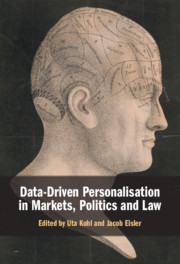Book contents
- Data-Driven Personalisation in Markets, Politics and Law
- Data-Driven Personalisation in Markets, Politics and Law
- Copyright page
- Contents
- Figures
- Tables
- Contributors
- Preface
- Part I Introduction: Theoretical Perspectives
- Part II Themes: Personal Autonomy, Market Choices and the Presumption of Innocence
- Part III Applications: From Personalised Medicine and Pricing to Political Micro-Targeting
- 9 ‘P4 Medicine’ and the Purview of Health Law: The Patient or the Public?
- 10 Personalised Pricing: The Demise of the Fixed Price?
- 11 Data-Driven Algorithms in Criminal Justice: Predictions as Self-fulfilling Prophecies
- 12 From Global Village to Smart City: Reputation, Recognition, Personalisation, and Ubiquity
- 13 Micro-targeting in Political Campaigns: Political Promise and Democratic Risk
- Part IV The Future of Personalisation: Algorithmic Foretelling and Its Limits
- Index
12 - From Global Village to Smart City: Reputation, Recognition, Personalisation, and Ubiquity
from Part III - Applications: From Personalised Medicine and Pricing to Political Micro-Targeting
Published online by Cambridge University Press: 09 July 2021
- Data-Driven Personalisation in Markets, Politics and Law
- Data-Driven Personalisation in Markets, Politics and Law
- Copyright page
- Contents
- Figures
- Tables
- Contributors
- Preface
- Part I Introduction: Theoretical Perspectives
- Part II Themes: Personal Autonomy, Market Choices and the Presumption of Innocence
- Part III Applications: From Personalised Medicine and Pricing to Political Micro-Targeting
- 9 ‘P4 Medicine’ and the Purview of Health Law: The Patient or the Public?
- 10 Personalised Pricing: The Demise of the Fixed Price?
- 11 Data-Driven Algorithms in Criminal Justice: Predictions as Self-fulfilling Prophecies
- 12 From Global Village to Smart City: Reputation, Recognition, Personalisation, and Ubiquity
- 13 Micro-targeting in Political Campaigns: Political Promise and Democratic Risk
- Part IV The Future of Personalisation: Algorithmic Foretelling and Its Limits
- Index
Summary
Cities around the world try to set standards for their digital agendas, and constructing smart city ‘roadmaps’. Taking stock of emerging approaches that seek to apply or supplement existing rules on privacy and data protection and to sustain public confidence and support in the face of innovation and change, challenges are explored. Drawing on a growing critical literature, in law, planning, and other fields, that seeks to identify the nature and implications of these developments beyond the promotional language of ‘smart’, the work of Sidewalk’s masterplan for a site in Toronto, and the Los Angeles Department of Transportation’s new and influential approach to mobility data (data associated with ridesharing, ‘micromobility’ such as e-scooters, and in time autonomous vehicles), is assessed. Two facets of urban technology that relate to (and ultimately enable) the delivery of personalised services by public authorities and others are then considered: ratings and reputation (highlighting Chinese cities deploying aspects of the emerging 'social credit’ systems) and facial recognition (noting that the ability to recognise individuals in this way, without a conventional and more deliberate identification (e.g. supplying a name, entering a password, or older biometric systems such as fingerprint scanning), is a key part of many proposed personalised services).
- Type
- Chapter
- Information
- Data-Driven Personalisation in Markets, Politics and Law , pp. 205 - 222Publisher: Cambridge University PressPrint publication year: 2021

